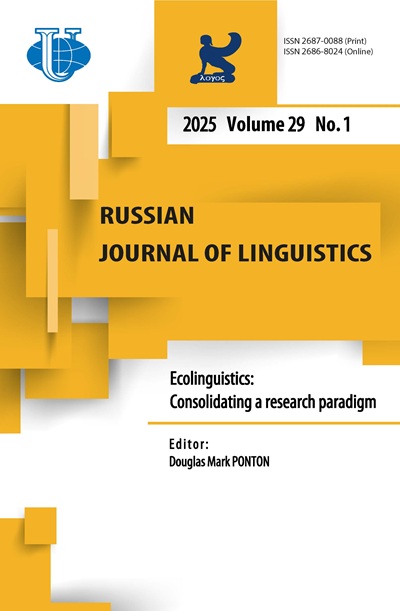No 4 (2008)
- Year: 2008
- Articles: 14
- URL: https://journals.rudn.ru/linguistics/issue/view/936
Articles
A semantic word structure as a fragment of a semantic structure of a system
Abstract
A semantic word structure is presented in the article as a fragment of a semantic structure of a diachronic system. A semantic word structure may exist in two states: in a language continuity and in a definite chronological period. The correlation of the semantic structure of the polysemy with the diachronic system structure doesn't allow to reveal the initial polysemantic meaning.
Russian Journal of Linguistics. 2008;(4):5-11
 5-11
5-11


Semantic and functional properties of toponymes
Abstract
Linguistic aspects of toponima are discussed in the article. Nomination of the language lexical units and speech elements is described. The mechanisms of semantic derivation and migration of proper names to the class of common names are shown. Linguistic investigations prove the creative character of nomination process.
Russian Journal of Linguistics. 2008;(4):12-17
 12-17
12-17


To the problem of vocative case category as the peripheral phenomenon of The Balkan Linguistic Union
 18-23
18-23


Research of common lexical times in turk and mongolian languages, for example, the kinship term «mother» researching
Abstract
The purpose of the study - the identification of common Turk-Mongolian lexical items with specific Turk and Mongolian features and language parallels under the certain criteria of examples. After a comparative study of these languages VL Kotwic concluded that the speaker had about 25% of the common features in the lexicon. For example, the similarities in terms of kinship in the Turk-Mongolian languages are few - about a dozen, the same way as in other languages, we can subdivide them into terms for relationship as a result of marriage and blood kinship terms.
Russian Journal of Linguistics. 2008;(4):24-31
 24-31
24-31


The category of finity and infinity in connection with other categories of a verb (on a material of Abkhazo-Adygian languages)
Abstract
In given article there is considered a number of factors which are not carefully studied in the special literature and testifying to close correlation of such verbal categories as finity and infinity, tense and modality in Abkhazo-Adygian (West-Caucasian) languages.
Russian Journal of Linguistics. 2008;(4):32-36
 32-36
32-36


Lingvocognitive features of adjectives through the prism of the paremiological picture of the world
Abstract
The article deals with the attempt to outline the contours of the paremiological linguistic picture of the world revealing some characteristic LSG of adjectives in it by the example of proverbs and sayings of the English language on the basis of the general review of the traditional linguistics positions and from the point of view of the cognitive approach to the linguistic picture of the world.
Russian Journal of Linguistics. 2008;(4):37-45
 37-45
37-45


Linguistic conception of loneliness verbalized with the help of words «neponimanie»/«incomprehension» in russian and english consciousness
Abstract
The main aim of this article is to investigate the linguistic conception of loneliness verbalized with the help of words «neponimanie»/«incomprehension» in Russian and English consciousness and to compare the results of this research.
Russian Journal of Linguistics. 2008;(4):46-52
 46-52
46-52


 53-56
53-56


 57-63
57-63


Evaluative suffixes in the structure of spanish phraseological locution
Abstract
The article considers Spanish phraseological locutions containing evaluative suffixes. Evaluative suffixes have different funcions in the structure of a phraseological unit and introduce to its semantics that are reflected in translation.
Russian Journal of Linguistics. 2008;(4):64-67
 64-67
64-67


Parallelism as a factor in the positional speech organisation of test («neighbours» by A.P. Chekhov)
Abstract
This article discusses the extremely important role of parallel motifs in A.P. Chekhov's short story «Neighbours». An analysis of the compositional speech organization of the short story «Neighbours» brings onto focus one of its most important compositional techniques - semantic structural parallelism.
Russian Journal of Linguistics. 2008;(4):68-74
 68-74
68-74


The problem of etymological interpretation of hybrids in modern Russian
Abstract
The paper is an attempt at the etymological interpretation of hybrids in modern Russian. Hybrids of different morphemic structure have examined in the paper. In author's opinion, hybrids take the intermediate place between vernacular words and loan-words in Russian language.
Russian Journal of Linguistics. 2008;(4):75-82
 75-82
75-82


 83-89
83-89


 90-95
90-95
















